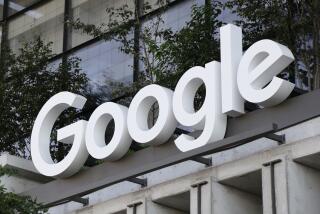Google plan raises privacy issue
Google Inc.’s purchase of DoubleClick Inc. would create the world’s single largest repository of details about people’s behavior online, an unnerving prospect for some privacy experts.
The $3.1-billion acquisition would combine two companies with massive troves of information about most people who use the Internet.
“This is something that is concerning,” said Kurt Opsahl, an attorney with the nonprofit Electronic Frontier Foundation.
Google’s associate general counsel, Nicole Wong, said Monday that Google did in fact hope to integrate the two companies’ “non-personally identifiable data,” and that mixing them would be of “great benefit” to both consumers and advertisers.
Personally identifiable data include names, physical addresses and the like.
An advertiser, Wong said, could use the information to make sure that a person wasn’t bombarded with the same ad again and again, cutting down on the annoyance level for surfers.
“Coca-Cola could ensure that a user does not see more than X number of Lime Coke search or display ads,” she said in an e-mail.
Some industry experts said the goal of using combined information to make ads more useful was a sound one -- as long as it was handled carefully.
“Provided consumers don’t feel snooped on, hyper-targeting makes everyone better off,” said Harvard Business School professor John Deighton. “Consumers don’t see irrelevant ads and advertisers spend less to get better results.”
Google dominates the market for selling text ads that appear next to search results, while DoubleClick has the largest independent system for placing banner ads.
On Monday, Microsoft Corp. and AT&T; Inc. asked the Federal Trade Commission to look carefully at Google’s proposed purchase of DoubleClick, saying it raised antitrust issues because it would reduce competition in online advertising.
Google retains all search requests indefinitely. It recently said it would stop keeping records that tie search requests to specific computers after 18 to 24 months.
DoubleClick, which has technology that places billions of ads on various websites daily, relies on what are known as tracking cookies placed on consumers’ computers. Once a Web surfer sees an ad delivered by DoubleClick on one site, he is marked and identified as the same person when he sees another ad on a different page. DoubleClick stores the user’s surfing history for two years.
That surfing history could be merged with Google’s search database to create what critics view as one-stop shopping for snoops. The fear is that the information -- all under the aegis of a single corporation -- might be more easily made available to government agencies, made public as evidence in civil litigation or accessed illegally.
Companies such as Google “are going to get more and more control over personal information,” said Ari Schwarz, associate director of the Center for Democracy and Technology.
Wong said Google would try to be sensitive in combining any data. She said the company would be sure to give users “real choices that are transparent to them” when it came to opting out of data collection.
Google is viewed as having a mixed record on privacy issues. The Mountain View, Calif.-based company opposed a Justice Department request for millions of searches that the agency wanted to sample and won a court battle over the matter. Other search engines complied with the request, although they don’t keep user histories for more than a few weeks.
For its part, DoubleClick was for years a lightning rod for fears about the loss of privacy on the Internet. A public outcry in 2000 ended the New York-based company’s efforts to use real-world names and Internet addresses in tracking online habits.
In 2002, DoubleClick settled lawsuits by state attorneys general and consumers over its privacy practices and promised to tell consumers more about their ability to block tracking cookies.
After those missteps, Harvard’s Deighton said, DoubleClick learned that “just because you can violate consumers’ expectations of privacy without breaking the law does not mean you should.”
At the same time, he added, “Google has had a long history of resisting the impulse to exploit individual surfing histories. I think they understand that it’s even more important to show that restraint now.”






